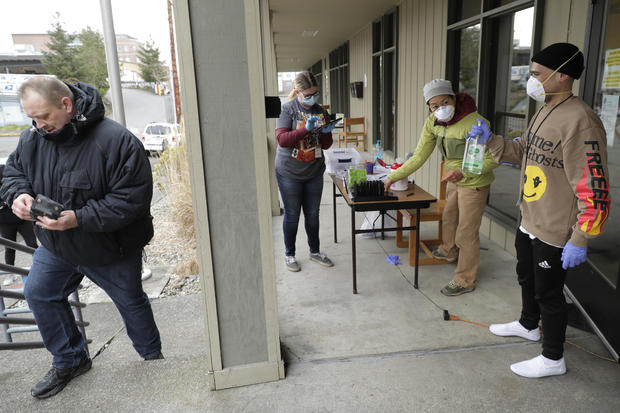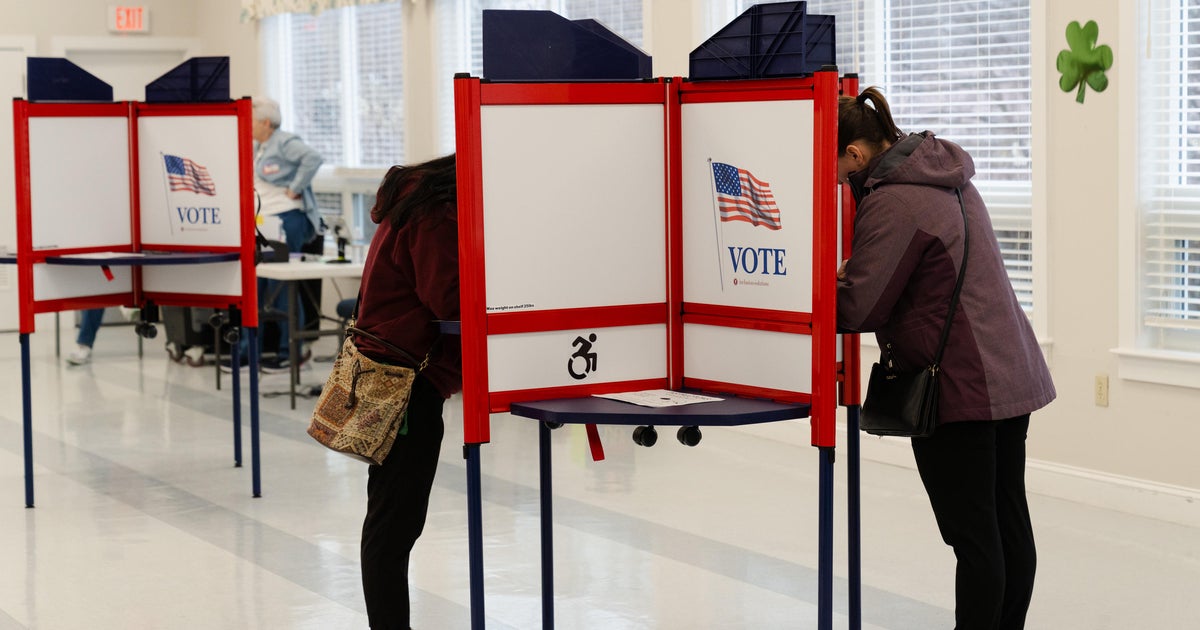How the coronavirus is hurting drug and alcohol recovery
When COVID-19 hit the U.S., public health professionals were already busy battling another epidemic – the drug crisis in this country. President Trump announced Wednesday that the nation will launch enhanced counter-narcotics operations in the Western Hemisphere to prevent drug cartels from exploiting the coronavirus pandemic.
"I've seen many families where they're wiped out because they lost a son or a daughter or a husband or wife. Or whatever. Or all of them," he said of the effects of drug abuse at the Coronavirus Task Force briefing. "And we don't want to lose ground."
Leading up to the 2016 election, Trump often tied widespread opioid addiction to his signature campaign theme — a wall at the U.S. southern border with Mexico — declaring drugs were pouring into the country through Mexico.
"We are heavily focused on the virus, very heavily focused," Trump told reporters Wednesday, but he added that after the operation launches, "we will never have been so focused on drugs coming into the country as we are right now."
Yet, beyond U.S. ports of entry, substance abuse patients and health care workers fighting the opioid epidemic face new challenges .
"COVID-19 is like a horrific tsunami that just killed us, exploded in the Northeast and is developing rapidly," Dr. Nora Volkow, director of the National Institute of Drug Abuse (NIDA) told CBS News. "So, of course we're paying attention to it, and we get distracted from this other crisis that is also killing a lot of people."
The risk of overdose
The opioid epidemic and the COVID-19 pandemic "have unfortunately crossed paths in a very lethal way," Allegra Schorr, president of the Coalition of Medication-Assisted Treatment (MAT) Providers and Advocates of New York State (COMPA) says. Schorr represents over 45 organizations serving 41,000 recovery patients in New York, the state hardest hit by the coronavirus pandemic. She wants to strike the right balance between reducing both the spread of the disease and risk of overdose for patients using Medical Assisted Treatment.
"We're like a frontline. We have to be able to keep our patients out of the hospital. We have to get that balance right. If they overdose, then they're going to be in the hospital taking up those resources," Schorr told CBS News. "They could be in the emergency rooms. We have the potential of crashing the hospital system. We have to make sure that does not happen."
"Every day there is a change. I think that is the biggest challenge – the unknown," Linda Hurley, president and CEO of CODAC Behavioral Health, told CBS News. Hurley runs the largest non-profit provider of outpatient services for opioid use disorder. Lately, she's seen her patient base grow amid the anxiety and stress of this pandemic. "On a daily basis, we're seeing more people presenting for admission than what our average was before this crisis."
Expanding access to medically assisted treatments such as methadone, buprenorphine and naltrexone has reduced mortality from opioid overdoses by close to 70%, according to the National Institute of Drug Abuse. Injections of naloxone to reverse overdoses in patients works "like magic," Volkow said, "but you need to administer it rapidly."
Nothing is quite as rapid in the age of COVID-19. That means the chances of overdose are rising. "We already have heard that some patients have overdosed from the methadone because they were not ready to take home these medications," she added, referring to the other assisted treatments.
Before the crisis, federal regulation required patients receiving methadone treatment to report to clinics six days a week, for their first 90 days. The routine served as both a diversion and stabilizing force in a patient's otherwise chaotic life.
Federal guidelines have been limited during the pandemic. "The only guidance we've had from federal governments and state governments across the country is to gauge how 'clinically stable' your patient is, then give them take-homes. And that leaves you wide open," Schorr said, imploring the Substance Abuse and Mental Health Services Administration to issue clearer protocol, instead of passing along liability to providers. "Without clear guidelines, as providers, we have a huge vulnerability. We're accepting it because we have to, but we know it is there."
Closed for business
While most recovery centers remain open for MAT pick-ups and patient onboarding, other non-clinical centers and syringe exchanges have closed, pending the pandemic's decline. Some residential programs have stopped accepting new patients.
Director of SOS Recovery Centers in New Hampshire, John Burns, was forced to close his doors in early March. "No one is paying attention to the fact that if you're homeless, you once had a recovery center. You might have had a public library or community center to go to. You can't go into quarantine when you're living in a tent," Burns says. "There's also a lot of real concern – some residential detox centers stopped accepting new patients."
The closure of residential programs is particularly hard on recovering addicts faced with the elements and nowhere else to go, Burns points out. "How do we shut that down? You wouldn't shut down a dialysis center."
Still, recovering individuals without housing can't practice social distancing, resulting in higher risk of infection. Many suffering from addiction also possess co-morbid physical conditions; reduced breathing, a lower oxygen level and suppressed immunity are all likely symptoms in opioid-addicted individuals.
"So, you have a double whammy," Volkow told CBS News. "You have a drug that is actively decreasing your ability to fight a viral infection while decreasing your respiration. And if you contract a pulmonary infection, your likelihood of surviving is lower."
In Manchester, New Hampshire, the Fire Department's Safe Station program has been forced to limit its hours. The first of its kind nationwide, the 24/7 entryway into treatment located at Fire Departments across the city can no longer accommodate those seeking help late at night.
If someone comes at 3 a.m., "we have nowhere to send them, [even] if they meet the criteria to enter the program," Manchester Fire Department District Chief Mike Gamache told CBS News. While firefighters are still offering help to those seeking recovery, entry into treatment has become a "moving target."
Meanwhile, workers on the frontline are facing glove and mask shortages. The Fire Department says its own PPE supply will likely run out within a week.
"We need personal protective equipment. We need it, and it's not coming. We need masks. We have churches making masks for us," Linda Hurley told CBS News. Local churches have stepped up to sew masks for recovery centers in Rhode Island in the interim. She said she's been seeing staff resign after the pandemic "put them over the edge."
Risks of social isolation
The facility shutdowns present yet another risk factor – social isolation. "Social isolation does not just contribute to the epidemic of addiction, but it also increases the likelihood that people take drugs," Volkow said.
It's part of the reason opioid use ballooned amid the 2008 recession. "The opioid epidemic in our country basically grew out of hopelessness and isolation," Volkow added. "And to the extent that the pandemic is going to exacerbate the economic and social situation of certain people, this could increase the risk of people turning to drugs."
Hurley told CBS News, "With these increased stressors, this highly confusing time with concerns about family, finance and health – those are usually triggers for folks."
Ashley Drew works as a criminal justice case manager for a recovery center in New Hampshire. The past few weeks have brought back memories of her heroin addiction.
"I'm a little over four years clean and sober," she said. "And I feel like I'm back to my grassroots on the very early stages." Establishing a great life, routed in routines and work-life balance aided her recovery. "However, this life that we're currently living is significantly different than the one I was just living."
"Boredom, stress, anxiety, all of those feelings" — Drew said the outlets once readily available to tackle those feelings have vanished. Luckily, online programs and support groups have helped to fill the gap.
Tele-medicine's silver lining
Alcoholics Anonymous suspended all in-person meetings, encouraging members to go online instead. For some, the results have been positive. Thirty-year AA veteran Billy T., who asked that his full name not be used, says he's been reunited online with old friends. Colleagues from his AA chapter in Hollywood have rejoined the group online after moving cross-country or overseas.
SOS Recovery Community formed a national online support group alongside partner centers in Oregon and Pennsylvania, offering free services to individuals in recovery. The group now reaches an average of 2,000 people daily, holding nine different support meetings via Zoom. During its launch, 9500 unique attendees joined the first week alone, with attendees from 16 different countries.
There have been heartwarming moments. Burns recalls when a brand new mother in residential recovery at Hope on Haven Hill celebrated her birthday, hundreds unmuted their conference lines to sing to her over zoom, resulting in "lots of tears."
Linda Hurley estimates 10% of her patient population will be challenged without the technology they need. Yet for those who can connect, her therapists who are tele-counseling have found patients more engaged: "They're absolutely enjoying sitting on their couch comfortably, talking to their therapist or counselor. They're sharing more."
In New York State, a free mental-health hotline has been established by 6,000 volunteer mental-health professionals so people can "talk to them about what you're feeling and what stress you're feeling," Cuomo announced last week.
One other possible upside —this crisis is likely to spur new research into remote medical practices. For example, Dr. Volkow reports that NIDA is researching automatic naloxone injections that could be triggered by themselves if an individual overdoses.




